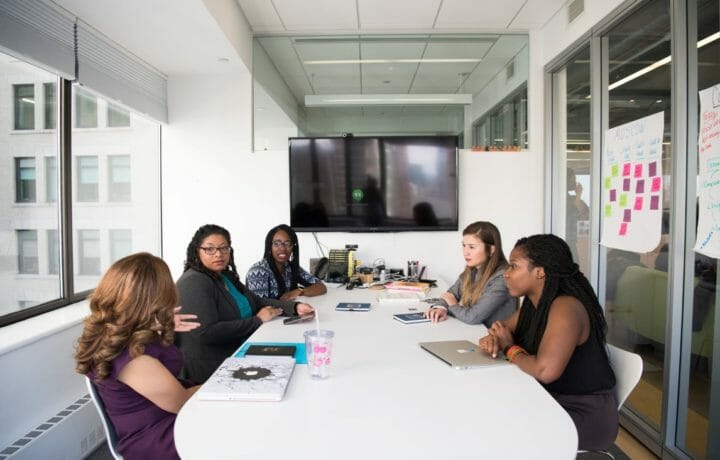The Intelligence and National Security Alliance (INSA) virtual symposium continued yesterday with an all-star lineup of speakers. This time, they mixed things up from the previous days and had TED-talk style ignite sessions.
PHYSIOLOGICAL DIFFERENCES BETWEEN MEN AND WOMEN – JILL BRUNING
With her 35 years in the industry, Jill Bruning spoke to leveraging differences in national security for success. Bruning currently leads the business and technical activities of the Amentum Intelligence, System Engineering, Security, Services & Solutions (IS4) Strategic Business Unit (SBU) as general manager (GM).
She admitted that she had never acknowledged or discussed her female position in the workplace, even though many times she has been the only female in the room. She used to preface points with groveling apologies, lacked confidence, and softened her language in professional settings to avoid being seen as difficult. “When I tried to emulate men by speaking more directly, I was often perceived as saying things offensively, and felt like I was in a no-win situation. Lots of women struggle with this dilemma,“ she advised.
The topic of physiological differences between men and women dominated the rest of her talk. Bruning explained that on average, women use three times as many words as male counterparts because women have verbal centers on both sides of their brains, while men only have one on the left hemisphere. There are more than 100 differences between the male and female brains, so when we think about the best outcomes in innovation, it’s when both brains work together. We need both males and females to support projects within the Intelligence Community (IC), maintaining gender balance as an important value for the best outcomes.
SpONSORSHIP AND MENTORSHIP – NATALIE ZYLSTRA
Sponsorship is a transactional relationship where both parties benefit by the conversation. Women tend to downplay this. Natalie Zylstra, who serves as the director in the Office of Data Strategy and Compliance at the National Counter-Terrorism Center (NCTC), reminds women that you’re not always going to be in the room. Zylstra identifies the need for a sponsor to advocate for you. Sponsors can help you take risks, identify stretch opportunities, and provide meaningful connections.
In conjunction with mentorship, personal branding is important in national security careers. Your uniqueness makes you, you. What is something extra you can offer your organization that helps you stand out? If you don’t know what that is, leverage your sponsor, peers, and supervisors.
Professionals should ask about the negative, too. People tend to sugarcoat feedback with women which can be detrimental to your progress, said Zylstra. Look for a sponsor that looks different than you, has different skills, and can also learn from your innate value.
Zylstra also reminded viewers that, as the 100th Anniversary of the 19th Amendment approaches, it’s important to acknowledge all the progress that we’ve made. “In 2000 we had token directors, and while we’re moving forward, we need to acknowledge we have a ways to go,” she said.
EFFECTIVE LEADERSHIP THROUGH ADVERSITY – HOPE GOINS
Hope Goins is the staff director of the United States House of Representatives Committee on Homeland Security. She is the top advisor to Committee Chairman Bennie G. Thompson on all matters related to the oversight of the DHS and national security-related matters throughout the Executive Branch. Goins spoke to the committee’s direction through COVID-19 as we hit the three million mark of confirmed cases and other adversity during the time of 2020.
She says that staff diversity under Chairman Thompson’s leadership has helped them create great legislation. “A staff that looks like America brings important values to America,” she says. She also noted that several representatives are collaborating with members of the IC to encourage them to attend career fairs in their districts, at historically black colleges, and at other institutions to bring in new talent and engage the next generation.
Hope shared a touching anecdote of when she first remembers feeling excluded because of her race. As a 6-year-old, everyone in her classroom received an invitation to a classmate’s birthday party. The next day, a group were told they were no longer invited to the party. The one trait they had in common is that they were black. She remembers the confusion – and the exclusion – and she strives to make sure this never happens in her committee in order to make our homeland security policies and processes the best they can be. She says these conversations should be happening more regularly within national security.
“We have the power to include, and we have the power to advance,” Hope explains. She asked the audience to consider how they are going to engage their power in the New IC.
GROUP THOUGHTS ON DIVERSITY
Companies with high inclusive engagement have three times the operating profit than those that don’t. The goal is to create a sense of belonging – to make people feel valued. The panelists called on women to help and support each other and be visible champions to eliminate barriers among women, but also to engage men to advocate and do their part.




